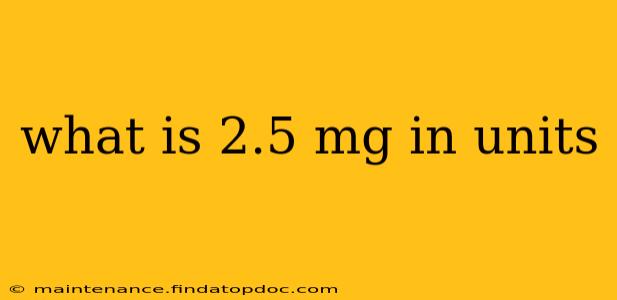What is 2.5 mg in Units?
The question "What is 2.5 mg in units?" is ambiguous because the term "unit" isn't a standardized measurement like milligrams (mg). "Units" depend entirely on the context—what substance are you measuring? Different medications, supplements, and even chemical solutions use different unit systems. To accurately convert 2.5 mg to units, we need to know what substance we're dealing with.
Let's explore some common scenarios where you might encounter this type of conversion:
1. Medications:
Many medications are measured in "units," but this unit is specific to that medication. For example, insulin is often measured in units, where one unit represents a specific amount of insulin. 2.5 mg of insulin is NOT equivalent to 2.5 units of insulin. The conversion factor varies greatly depending on the type of insulin. There's no general conversion. You must refer to the specific medication's packaging or consult a pharmacist or doctor. They will be able to tell you the equivalent dosage in units for that particular medication.
2. Vitamins and Supplements:
Similarly, vitamins and supplements often use "units" to represent the potency of a particular vitamin or nutrient. For example, vitamin D is often measured in IU (International Units). Again, there's no universal conversion from mg to units for vitamins. The specific conversion will depend entirely on the vitamin or supplement in question. Check the label for details.
3. Enzymes and other biological substances:
In biochemistry and other scientific fields, "units" might refer to enzyme activity or the concentration of a specific biological substance. The definition of a "unit" in these cases is highly specific and requires understanding the assay used to measure the activity or concentration. There’s no general conversion.
4. No Conversion Possible without Context
In short, without knowing the specific substance you are measuring, it is impossible to convert 2.5 mg to units. The term "unit" is not a universal unit of measurement; it's context-dependent. Always refer to the product's labeling or consult a professional for accurate conversions.
How to Find the Correct Conversion:
-
Check the product label: The label of any medication, supplement, or other substance should clearly indicate the units of measurement used and might provide conversion information.
-
Consult a pharmacist or doctor: For medications, seeking professional guidance is crucial to avoid errors in dosage.
-
Refer to scientific literature: For biological substances, refer to the specific research papers or protocols that define the "unit" used.
In conclusion, understanding the context is critical when dealing with "units" as a measurement. 2.5 mg cannot be directly converted to units without knowing precisely what substance is being measured. Always double-check your source and seek professional advice when necessary.
